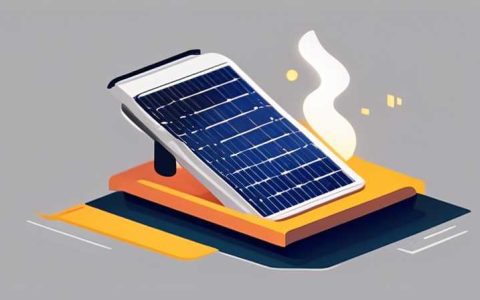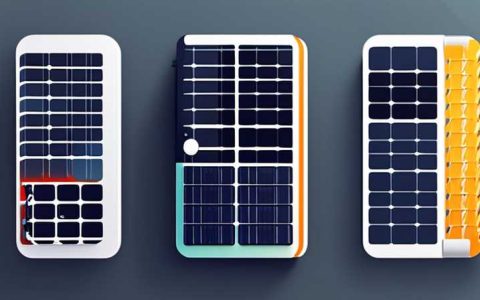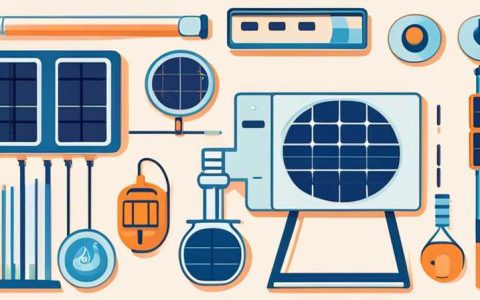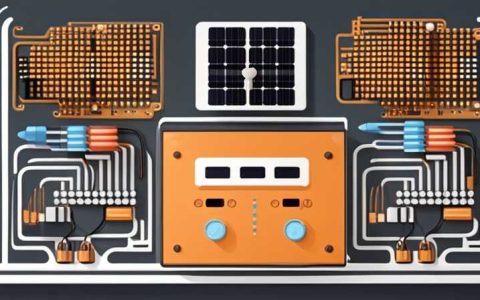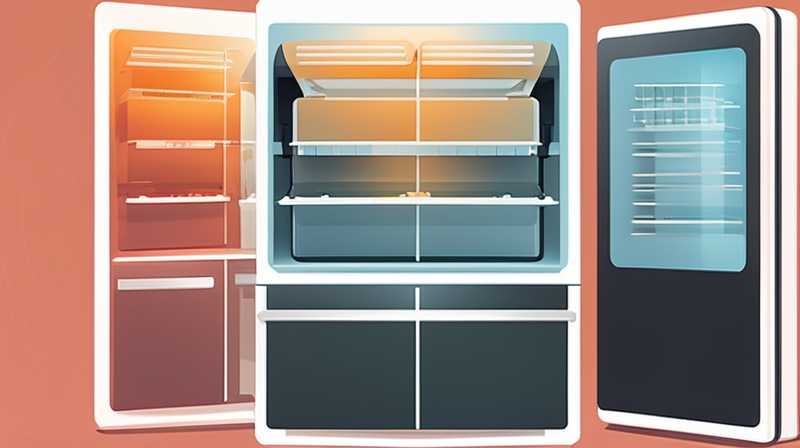
1. The quality of solar refrigerators is determined by several key factors: 1. Efficiency of solar energy conversion, 2. Durability of materials used, 3. Performance in various environmental conditions, 4. Temperature maintenance and storage capacity. Among these, the efficiency of solar energy conversion is crucial; it dictates how effectively the device can utilize solar energy to maintain appropriate temperatures. For instance, high-quality solar refrigerators encompass advanced photovoltaic technologies and energy management systems that optimize energy usage, ensuring that the device operates seamlessly even on days with limited sunlight. Analyzing these components yields insights into the growing appeal of solar refrigerators for both residential and commercial applications.
1. EFFICIENCY OF SOLAR ENERGY CONVERSION
The efficiency rate at which a solar refrigerator converts available solar energy into usable power is paramount. Photovoltaic panels are the primary components responsible for capturing sunlight and converting it into electricity. The quality of these panels often determines the effectiveness of the refrigerator. Higher efficiency panels can convert a greater percentage of sunlight into electrical energy, significantly enhancing the device’s performance.
Modern solar refrigerators frequently utilize monocrystalline or polycrystalline solar panels. Monocrystalline panels tend to offer superior efficiency and longevity, making them a preferable choice for high-quality solar refrigeration systems. Furthermore, the power management system plays a vital role in enhancing overall efficiency. Advanced models incorporate smart management systems that monitor energy production and consumption, adjusting demand response strategies accordingly. This ensures that the refrigerator operates optimally, drawing just the right amount of energy to function effectively.
Variability in sunlight exposure – influenced by geographic location and seasonal changes – impacts solar energy capture. Consequently, manufacturers build solar refrigerators with battery storage systems. These batteries store excess energy generated during sunny periods, allowing the refrigerator to function during cloudy conditions or at nighttime. The ability to maintain efficiency even during periods of low sunlight is a critical determinant of quality, ensuring that food and temperature-sensitive items are preserved effectively.
2. DURABILITY OF MATERIALS USED
In assessing the quality of solar refrigerators, the durability of materials is a significant indicator of long-term performance. The materials used in the construction of both the exterior and the interior components can significantly influence longevity and user satisfaction. High-quality models typically feature robust casings made of corrosion-resistant metals or durable plastics that withstand extreme weather conditions and potential physical damage.
Furthermore, insulation quality plays a vital role in maintaining the internal temperature. Inadequate insulation can lead to energy loss while forcing the refrigerator to work harder to maintain cool temperatures. High-quality solar refrigerators often utilize polyurethane foam or similar advanced insulation materials that enhance thermal resistance. This not only contributes to energy efficiency but also benefits the environment by reducing energy waste and overall carbon footprint.
Quality assurance testing must also assess material performance under varying temperature ranges and humidity levels. Indicators of durability include resistance to UV rays, which can degrade materials over time, particularly in outdoor installations. Manufacturers that prioritize high-grade components tend to deliver products that not only perform well but also retain aesthetic beauty and operational efficiency throughout their lifespan.
3. PERFORMANCE IN VARIOUS ENVIRONMENTAL CONDITIONS
High-quality solar refrigerators are designed to perform reliably across diverse environmental conditions. Temperature variations, humidity levels, and sunlight intensity can affect the overall function and efficiency of these appliances. Manufacturers often conduct rigorous testing to ensure that their products can maintain optimal cooling performance in various climates, from arid regions with extreme heat to areas experiencing cold winters.
An effective approach to maintaining performance is the incorporation of advanced refrigeration technology. Inverter compressors, for instance, can intelligently adjust their operational speed based on the ambient temperature, allowing for optimal cooling efficiency without compromising energy consumption. This flexibility not only enhances performance under fluctuating climates but also expands the device’s versatility, making solar refrigerators suitable for diverse applications.
Moreover, user-friendly features, such as adjustable temperature settings, contribute positively to the performance evaluation. It’s essential for users to have control over the interior temperature, especially when storing various perishables that may require differing conditions. High-quality models will often include multiple storage compartments with tailored cooling options to efficiently address specific user needs.
4. TEMPERATURE MAINTENANCE AND STORAGE CAPACITY
The ability to maintain proper temperatures effectively is a cornerstone of quality in solar refrigerators. For both household and business use, temperature maintenance is crucial for food safety and preservation. High-quality models demonstrate reliable performance in maintaining stable internal temperatures, minimizing fluctuations that could compromise stored items.
Storage capacity is also a significant aspect of a refrigerator’s utility. Ideal solar refrigerators will combine energy efficiency with adequate storage solutions, allowing users to maximize their storage needs without compromising on performance. Some models even include customizable shelving options, increasing versatility in how space can be utilized effectively.
Additionally, the inclusion of advanced cooling technologies can enhance temperature control. Rapid cooling features or smart cooling technology enable quick adjustments to internal temperatures, particularly useful when the refrigerator is loaded with warm items. These technologies ensure that even after opening the fridge frequently—potentially allowing warm air to enter—quality models maintain the necessary cooling requirements to keep perishables fresh.
5. COST-EFFECTIVENESS AND LONG-TERM SAVINGS
Another critical element that sets apart high-quality solar refrigerators is their cost-effectiveness. While the initial investment may be higher compared to conventional refrigerators, the long-term operational savings can be substantial. Solar refrigerators often eliminate or significantly reduce electricity costs by utilizing renewable solar energy, appealing to those conscious about utility expenses.
Additionally, the reduced reliance on the electrical grid aligns with sustainability principles. This not only leads to economic benefits for users but also contributes positively to environmental conservation efforts. Manufacturers may also provide warranties or support services that further solidify the investment value, ensuring that users can rely on the longevity of their appliances.
Furthermore, high-quality solar refrigerators might include features that promote energy-saving practices, such as energy-efficient LED lighting or programmable settings. Incorporating these features can lead to even greater savings over time, as they help reduce power consumption. Users benefit from enhanced system efficiency without sacrificing cooling capacity.
FREQUENTLY ASKED QUESTIONS
WHAT ARE THE MAIN ADVANTAGES OF SOLAR REFRIGERATORS?
Solar refrigerators offer a multitude of advantages, making them a compelling choice for those seeking eco-friendly refrigeration solutions. Firstly, the reliance on renewable energy significantly reduces electricity costs, allowing consumers to save money over time. This aspect is particularly advantageous for individuals living in rural locations where conventional power sources may be limited or unreliable.
Secondly, these units are excellent for reducing one’s carbon footprint. As they operate on solar energy, solar refrigerators help decrease dependence on fossil fuels and minimize greenhouse gas emissions. This is increasingly important in a world that is becoming more aware of environmental issues.
Moreover, solar refrigerators often feature superior insulation and energy management systems. This means that they not only cool effectively but also maintain temperature stability more efficiently than many traditional options. The integration of battery systems allows these refrigerators to function even during times of low sunlight, ensuring that food and perishable items remain safe. As technology continues to evolve, solar refrigerators are likely to become even more advanced, offering users higher quality and better performance.
HOW DO I SELECT A HIGH-QUALITY SOLAR REFRIGERATOR?
Choosing a solar refrigerator involves consideration of several integral factors to ensure optimal performance and longevity. First, assess the energy conversion efficiency of the solar panels. Premium models utilize high-efficiency panels that convert more sunlight into usable energy, which is essential for maintaining lower internal temperatures.
Next, evaluate the durability of the materials used in construction. Look for corrosion-resistant materials and quality insulation that can endure various temperature and humidity levels. The right insulation will not only affect performance but also influence energy efficiency, thus potentially decreasing operational costs over time.
Another critical consideration is storage capacity and temperature maintenance features. Review internal configurations, climate-friendly technology, and the flexibility of temperature settings to ensure they align with your refrigeration needs. Research user reviews and manufacturer warranties to ascertain reliability for the specific unit being considered.
HOW DOES A SOLAR REFRIGERATOR WORK?
Understanding the operational mechanics of a solar refrigerator can shed light on its efficiency and benefits. These appliances primarily harness sunlight through photovoltaic panels, converting light energy into electricity. This electricity is then used to power the compressor and cooling systems within the refrigerator, thereby maintaining a consistent internal temperature.
In addition to direct solar energy use, high-quality solar refrigerators typically include battery storage systems. These batteries are charged during daylight hours when solar energy is abundant, allowing the refrigerator to draw on stored power during nighttime or cloudy conditions. This balance ensures that the cooling remains effective regardless of immediate sunlight availability.
Temperature regulation is managed through a controlled system capable of adjusting compressor activity based on the internal temperature. Users benefit from innovative technology that allows for quick cooling and effective energy use, highlighting the remarkable efficiency of well-crafted solar refrigeration systems.
FINAL REMARKS
In considering the quality of solar refrigerators, numerous factors come into play that can significantly influence both their performance and user satisfaction. The efficiency of solar energy conversion stands out as a core attribute influencing operational competence. The durability of materials utilized in construction and the appropriateness of refrigeration technologies contribute meaningfully to product longevity.
Furthermore, effectiveness in diverse environmental settings and capability in maintaining appropriate storage conditions are critical dimensions that cannot be overlooked. Users also benefit from the cost-effectiveness of these devices in the long term, where initial investments yield considerable savings on electricity and maintenance.
Individuals seeking to invest in solar refrigerators should conduct thorough research, weighing available options concerning alignment with personal or business requirements. Taking these considerations into account helps consumers make informed decisions that prioritize sustainability, efficiency, and practicality, ensuring a positive impact on both their lifestyles and the environment. Adopting solar refrigerators creates a path toward a more sustainable and cost-effective future, catering to growing awareness of green energy solutions and environmental preservation.
Original article by NenPower, If reposted, please credit the source: https://nenpower.com/blog/what-is-the-quality-of-solar-refrigerator/




